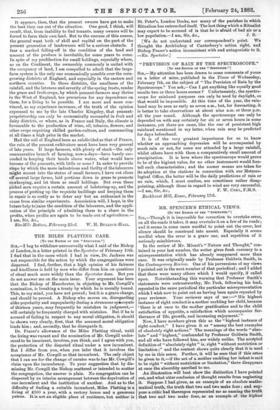THE PROSPECTS OF ENGLISH LAND.
[TO THE EDITOR OP THE "SPECTATOR.')
Six,—As the Land Question is exciting such general interest, and our Land System is being so severely tried by agricultural depression, I venture to ask for space ih the Spectator to state my views and experience on the subject. Having for upwards of a quarter of a century divided my time between England and the Continent, where I have been much associated with peasant- proprietors, I have enjoyed unusual facilities for comparing the English and Continental systems of land tenure and cultivation.
Although I am now the owner of extensive estates, mostly divided into large farms, I cannot rid myself of a strong leaning to peasant-proprietorship, wherever such proprietorship is economically possible, and am decidedly of opinion that th ownership of land cannot be severed frem the cultivation of it without both economical and moral loss to the community. Our system of letting our land to tenant-farmers is, I believe, inherently vicious, encouraging, as it does, the tendency to con- flicts of interest, concealment of facts, and the grudging treat- ment of the soil. Under that system, now that agriculture is depressed, the land itself is turning restive, and refuses to sup- port the gentleman-owner, the widow and younger children of the preceding owner, the gentleman-farmer and the labourer, in addition to the heavy burden of the rates.-
As long as landowning remains such a losing and precarious business as it is at present, I have little hope of much relief from any land legislation. For where is the advantage of the liberty to sell, given to life-tenants by Lord Cairns' Act of last Session, at a time when agricultural land is unsaleable, except at a ruinous sacrifice P What hope is there of tenant-farmers- the most desirable purchasers—half ruined by the badness of the times, coming forward as bidders for the land they occupy ? I am tired of urging in vain some of my own tenants to relieve me of the burden of owning so much land. The labourers, unfortunately, having no money, are still less likely buyers, and the inducement to capitalists to invest in land are becoming less every year. Social influence is diminishing, sporting is threatened, and the difficulty of letting it increases. It appears, then, that the present owners have got to make the best they can out of the situation. One good, I think, will result, that, from inability to find tenants, many owners will be forced to farm their own land. But to the success of this course, the general want both of skill and capital on the part of the present generation of landowners will be a serious obstacle. I fear a marked falling-off in the condition of the land and amount of the produce is inevitable, for some years to come. In spite of my predilection for small holdings, especially where, as on the Continent, the ownership commonly is united with the occupancy of land, I am compelled to admit that the large- farm system is the only one economically possible over the corn- growing districts of England, and especially in the eastern and northern counties. In those districts, the smallness of the rainfall, and the lateness and severity of the spring frosts, render the grass and fruit-crops, by which peasant-farmers may thrive in the West of England, too precarious for any dependence on them, for a living to be possible. I am more and more con- vinced, as my experience increases, of the truth of the opinion expressed to me by the late Charles Kingsley, that peasant- proprietorship can only be economically successful in fruit and dairy districts, or where, as in France and Italy, the climate is favourable to the production of wine, oil, tobacco, flowers, and other crops requiring skilled garden-culture, and commanding at all times a high price in the market.
Had the soil of England been as subdivided as that of France, the ruin of the peasant cultivators must have been very general of late years. If large farmers, with plenty of stock—the only remunerative branch of farming, now-a-days—have barely suc- ceeded in keeping their heads above water, what would have become of the peasants, with little or none ? In order to provide steps by which the more industrious and thrifty of the labourers might mount into the status of small farmers, I have cat slices of several large farms, laid portions down in grass to promote cowkeeping, and let them as small holdings. But even these picked men require a certain amount of bolstering-up, and the process of putting up the requisite buildings and keeping them in repair is so costly as to deter any but an enthusiast in the cause from similar experiments. Association will, I hope, in the future help to raise the condition of the labourers, and the appli- cation of the principle of admitting them to a share in the profits, when profits are again to be made out of agriculture.— I am, Sir, &c., Six-Mile Bottom, February 23rd. W. H. BULLOCK-HALL.



































 Previous page
Previous page